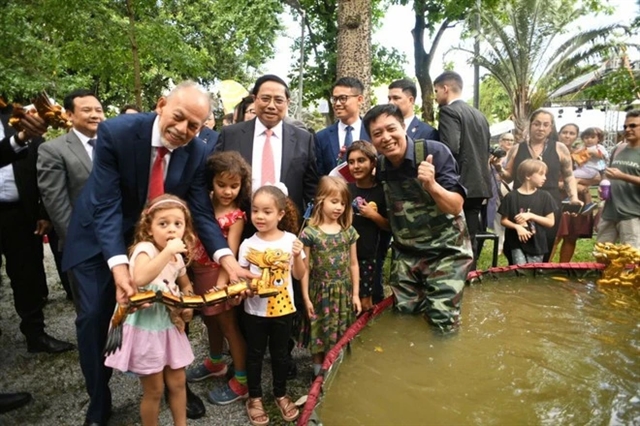 Politics & Law
Politics & Law

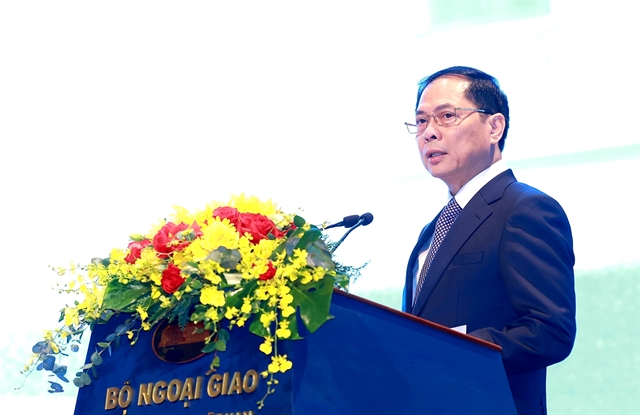 |
| Deputy Prime Minister and Minister of Foreign Affairs Bùi Thanh Sơn. — VNA/VNS Photo Dương Giang |
HÀ NỘI — Việt Nam’s diplomacy in 2025 will focus on maintaining peace and stability while ensuring national protection for a new era of growth breakthroughs, according to Deputy Prime Minister and Minister of Foreign Affairs Bùi Thanh Sơn.
Diplomatic activities will play a key role in this process, especially as the year 2025 will see major national anniversaries and the end of the country's five-year socio-economic development plan, he said at a recent review of Việt Nam’s diplomacy in Hà Nội.
Amid complex global developments, comprehensive, active, innovative and effective foreign policies have been carried out under the direct and consistent leadership of the Politburo, the Party Secretariat and the government, according to the deputy prime minister.
These policies have made significant contributions to peace and stability, supporting socio-economic development and protecting national independence and territorial integrity while also enhancing Việt Nam’s position in the world.
In addition to improving the capacity of the diplomatic workforce, key missions for national diplomacy include ensuring accurate insights and forecasts on emerging global trends and issues, and implementing comprehensive diplomatic activities at all levels of the Party, the State and among the people.
Implementing the Party Central Committee (PCC)'s Resolution 18 on perfecting the structure of the government apparatus, the foreign ministry must ensure unified diplomatic work after taking over the tasks of the commissions for external relations under the PCC and the National Assembly (NA).
Lê Hoài Trung, head of the current PCC’s Commission for External Relations, said: “National diplomacy will take on very challenging but also very honourable missions. I trust that the sector will continue to see progress and fulfil the tasks assigned in this new phase.”
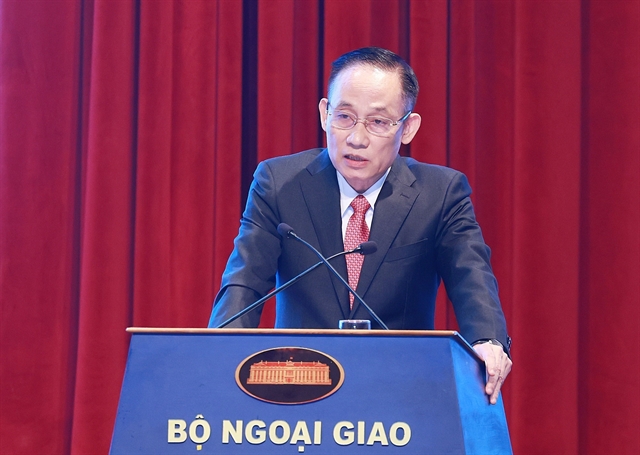 |
| Lê Hoài Trung, head of the current Party Central Committee's Commission for External Relations. — VNA/VNS Photo Dương Giang |
Sơn also noted that in terms of economic diplomacy and foreign economic relations, the decisive direction of the Prime Minister led to remarkable progress in trade, investment, digital transformation, green transformation, semiconductors and artificial intelligence, helping to maintain Việt Nam’s position among high-growth countries and its foreign trade and investment attraction amid global uncertainties.
Trade and investment
In 2024, Việt Nam successfully negotiated and ratified several free trade agreements (FTAs) as well as bilateral and multilateral cooperation mechanisms. Currently, the country is a member of 20 FTAs, 16 of which are already in effect.
The Ministry of Foreign Affairs (MoFA) and the Ministry of Industry and Trade (MoIT) are working together to maximise the potential of these agreements, while also seeking new opportunities to establish FTAs with countries in North Africa, South Asia and South America.
Meanwhile, the MoFA and the Ministry of Science and Technology (MoST) approved a cooperation programme on economic diplomacy to promote science, technology and innovation development through 2026.
At the same time, with multiple diplomatic activities related to technology last year, Việt Nam has established access to advanced technology and cooperation with global tech giants.
Việt Nam has become the destination for major tech companies such as Google, Samsung and NVIDIA, which plan to establish research and development centres within the country's borders, helping it integrate further into the global value chain.
Bilateral relations
Việt Nam has continued to maintain positive progress with its diplomatic partners.
2024 was the first year of the Việt Nam-US Comprehensive Strategic Partnership (CSP), with bilateral relations seeing tangible results in key areas.
Their mutual trust and respect have been strengthened through high-level exchanges and cooperation in multilateral forums.
In terms of trade and economic relations, data from the US showed that trade turnover between the two countries reached US$123.2 billion as of October 2024, equivalent to 19.5 per cent growth. It is estimated that this figure reached up to $150 billion by the end of the year.
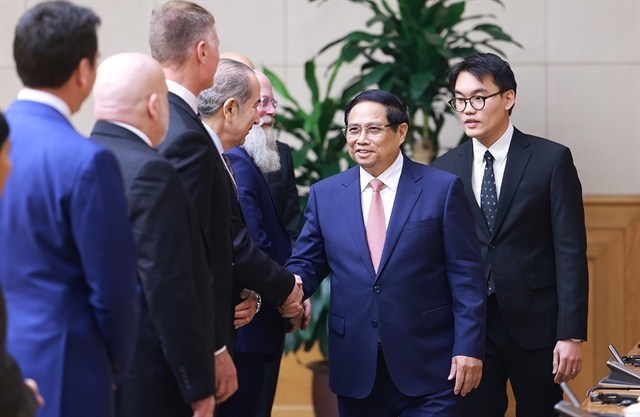 |
| Prime Minister Phạm Minh Chính meets a delegation from the US-ASEAN Business Council (USABC) in Hà Nội in December 2024. — VNA/VNS Photo Dương Giang |
Technology and innovation cooperation between Việt Nam and the US has also seen progress, notably in artificial intelligence and the semiconductor industry.
Proposing a future direction for bilateral ties, Vietnamese ambassador to the US Nguyễn Quốc Dũng suggested strengthening relations with the new administration of President-elect Donald Trump through high-level delegation exchanges, enhancing policy research and reviewing issues of mutual interests for both countries.
Noting that 2025 would mark the 30th anniversary of the normalisation of relations between Việt Nam and the US, Dũng said that this would be an occasion to strengthen ties and maintain the growth momentum of the CSP.
Meanwhile, Việt Nam and Russia are continuing their traditional friendship, with Russian President Vladimir Putin visiting the Southeast Asian country in June 2024.
Vietnamese PM Phạm Minh Chính also travelled to Kazan, Russia for the expanded BRICS Summit in October and held talks with the Russian president on bilateral cooperation.
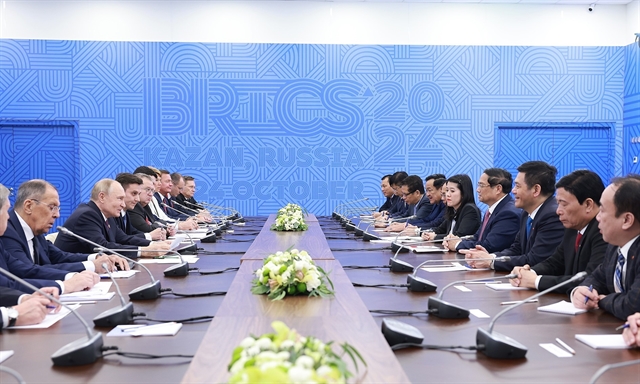 |
| Prime Minister Phạm Minh Chính holds talks with Russian President Vladimir Putin on the sidelines of the expanded BRICS Summit in Kazan, Russia in October 2024. — VNA/VNS Photo Dương Giang |
Vietnamese ambassador to Russia Đặng Minh Khôi said that Việt Nam also needed to prepare for competition in the Asia-Pacific region, maintain relations with its partners and balance political and economic cooperation.
Relations between Việt Nam and its neighbour Laos continue to be strengthened with active cooperation in various aspects, notably national defence, investment, education and multilateral forums.
Nguyễn Minh Tâm, ambassador of Việt Nam to Laos, noted that Vietnamese ministries and localities needed to closely coordinate with their Lao partners to carry out the agreements between the two Parties and governments, while sharing experiences in maintaining peace and stability in the region.
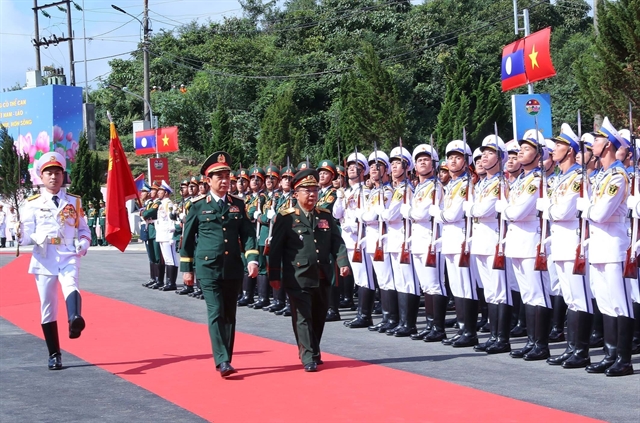 |
| Vietnamese Defence Minister Phan Văn Giang and Lao Deputy Prime Minister and Defence Minister Chansamone Chanyalath review the guard of honour at the second Việt Nam-Laos border defence friendship exchange in October 2024. — VNA/VNS Photo Trọng Đức |
Parliamentary cooperation
Việt Nam’s multilateral foreign affairs were also carried out with active participation from the Vietnamese National Assembly in global and regional inter-parliamentary forums.
Cooperation activities at the parliamentary level in 2024 were implemented in a comprehensive, consistent and harmonious manner, ensuring coordination with Vietnamese diplomatic missions.
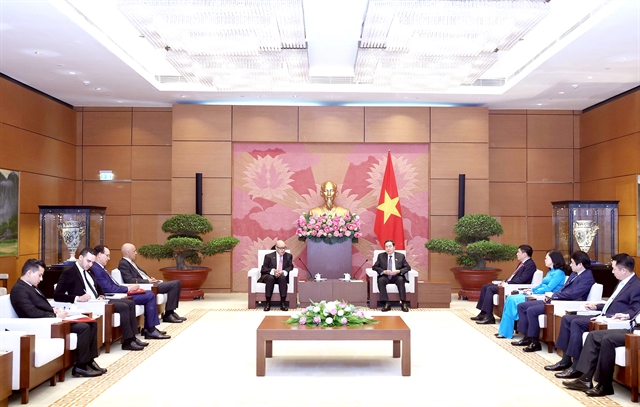 |
| National Assembly Chairman Trần Thanh Mẫn meets Najib El Khadi, President of the Association of Secretaries General of Parliaments, in Hà Nội in June 2024. — VNA/VNS Photo Thống Nhất |
In 2025, the NA’s external relations tasks will focus on strengthening Việt Nam’s ties with other countries at the parliamentary level, while also promoting economic diplomacy to fulfil socio-economic development goals and targets.
Lê Anh Tuấn, deputy head of the NA’s external relations committee, also noted that the legislative body would focus on addressing institutional barriers in trade, economic and investment cooperation with other countries, as well as integrating Việt Nam’s international commitments in national policies.
The NA would continue to boost multilateral diplomacy by actively proposing initiatives and hosting important inter-parliamentary meetings, as well as engaging in parliamentary cooperation forums such as the ASEAN Inter-Parliamentary Assembly (AIPA), Inter-Parliamentary Union (IPU), Asia-Europe Parliamentary Partnership (ASEP), Asia Pacific Parliamentary Forum (APPF) and Mekong sub-regional cooperation mechanisms.
Other focuses include monitoring the implementation of international treaties and agreements within the framework of bilateral and multilateral cooperation, and cooperation mechanisms between the Vietnamese NA and other parliaments. — VNS




